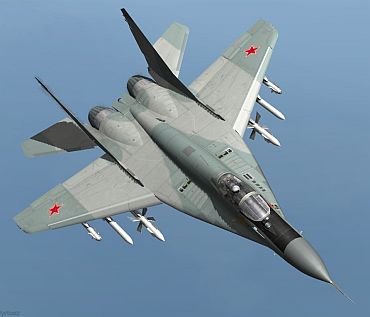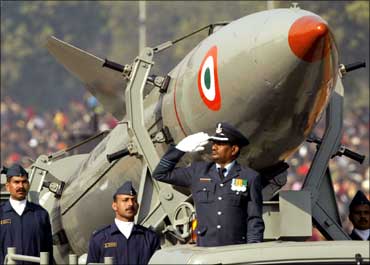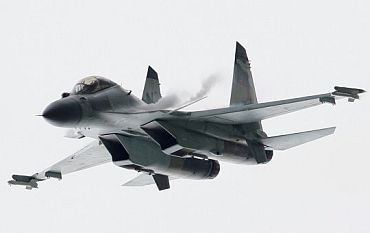 | « Back to article | Print this article |
Tatas in record deal to modernise 30 Air Force bases
A Tata company has won the largest-ever defence contract awarded to an Indian private sector company through a competitive global tender.
On March 16, the Ministry of Defence signed a Rs 1,094-crore (Rs 10.94 billion) contract with Tata Power's Strategic Electronics Division (Tata Power SED) for modernising 30 Indian Air Force (IAF) airbases across the country.
Tata Power SED has 42 months to execute this strategically vital contract, officially called Modernization of Airfield Infrastructure, or MAFI.
Starting with the Bathinda airbase in Punjab, Tata Power SED will refurbish and modernise airfield infrastructure so that the IAF can operate its next generation of modern combat aircraft from there.
Click NEXT to read on . . .
Tatas in record deal to modernise 30 Air Force bases
State-of-the-art Air Traffic Management systems will be installed, along with Category-2 airfield lighting systems and hi-tech navigational aids that will permit flying operations at night and in adverse weather.
The 30 IAF airbases that will be modernised under MAFI include eight key airfields along the Sino-Indian border such as Chabua, Tezpur and Hashimara.
The IAF has already begun deploying frontline Sukhoi-30MKI fighters to the Tezpur air base in concert with the army's raising of two new divisions to strengthen defences along the Sino-Indian border.
This will be followed by the MAFI Phase II contract for refurbishing another 28 airbases. The current contract has an option clause, which allows the ministry to invite Tata Power SED to execute the Phase II of MAFI at a pre-determined rate.
Click NEXT to read on . . .
Tatas in record deal to modernise 30 Air Force bases
The ministry has not yet announced the award of this contract. Approached for comments, Tata Power SED declined comment until an official announcement was made.
India's private sector defence companies view this as a major milestone in their protracted struggle to enter the defence sector on equal terms with defence public sector undertakings and foreign companies.
On January 13, the ministry released the first-ever Defence Production Policy that explicitly encourages the private sector to enter defence production.
The MAFI contract has been bitterly contested, with Italian giant Selex Sistemi Integrati petitioning the Delhi High Court after its price bid of Rs 1,141 crore (Rs 11.41 billion) narrowly lost by Rs 47 crore (Rs 470 million) to Tata Power SED's winning quote (figures from Selex Sistemi Integrati's petition to the Delhi High Court).
Click NEXT to read on . . .
Tatas in record deal to modernise 30 Air Force bases
Despite legal delays -- in which the Delhi High Court and then the Supreme Court rejected Selex's contention that the Tata consortium did not have the technical capability and experience to upgrade the 30 IAF airfields -- the ministry managed to finalise the MAFI contract in just over three years.
The Defence Procurement Policy stipulates two-three years to finalise a contract.
Tenders for the MAFI contract were issued on January 4, 2008, and vendors submitted bids within six months.
After a technical evaluation of the vendors' proposals, the ministry opened their commercial bids on August 2009.
Click NEXT to read on . . .
Tatas in record deal to modernise 30 Air Force bases
Selex went to the court in November 2009 but, on November 24, 2010, the Supreme Court rejected its petition, declaring, "This court is not a Robin Hood do you want us to stop the modernisation of the airfields?"
Selex Sistemi Integrati has executed several major contracts to modernise airfields in Pakistan and China over recent years.
This fact, along with the legal challenge that it threw at the ministry, has seriously damaged its prospects of winning future defence contracts, say senior ministry officials involved in procurement.
Notwithstanding the courts' relatively speedy rejection of Selex's plea that the MAFI contract had been improperly awarded, the Italian company's petition spun off a broader legal question --- whether foreign companies are entitled to the protection of Article 19 of the Constitution of India.
Click NEXT to read on . . .
Tatas in record deal to modernise 30 Air Force bases
This article, which Selex cited in its petition, provides citizens of India (note, not foreign nationals) freedoms such as those of movement, speech, assembly, formation of unions, etc.
The two-judge Delhi High Court Bench that considered Selex's petition referred the question to a higher Bench, noting, "Almost all large tenders today are being challenged in writ proceedings before the Court and are coming up for judicial scrutiny. It is thus necessary to settle the legal issue in question."
The Supreme Court is expected to pronounce a verdict on this question on May 19.






